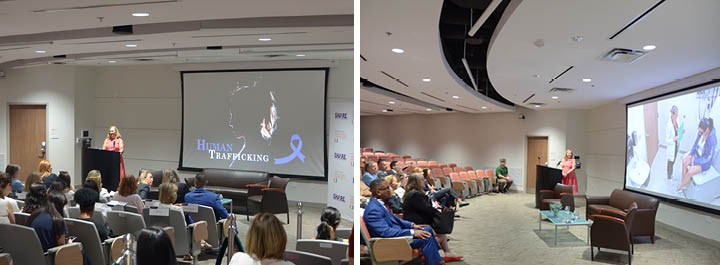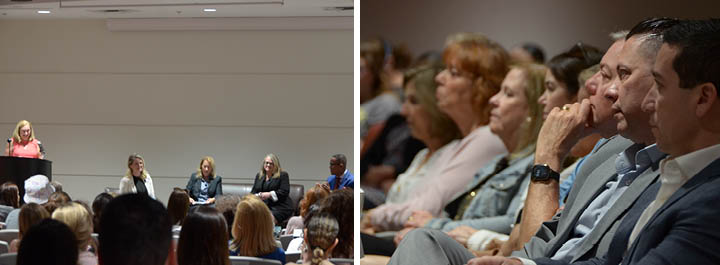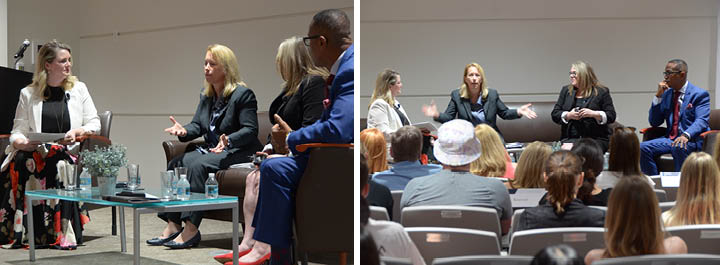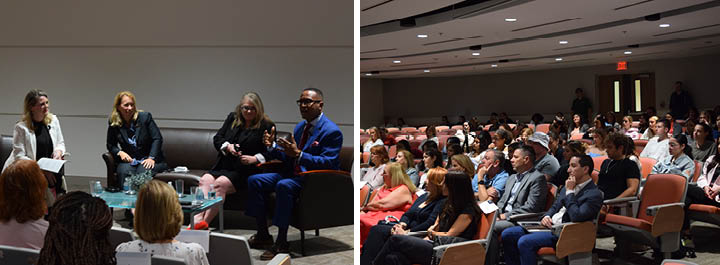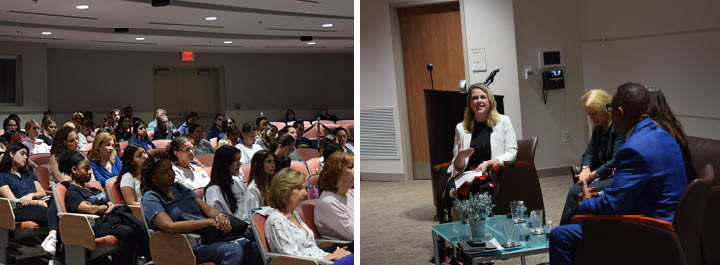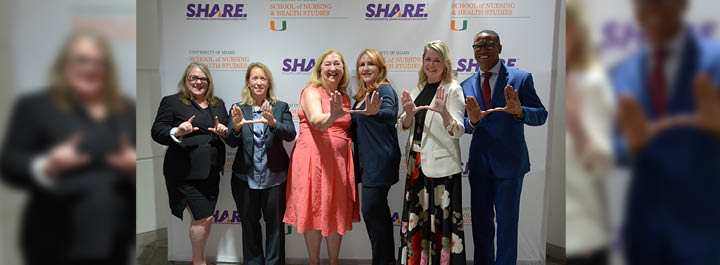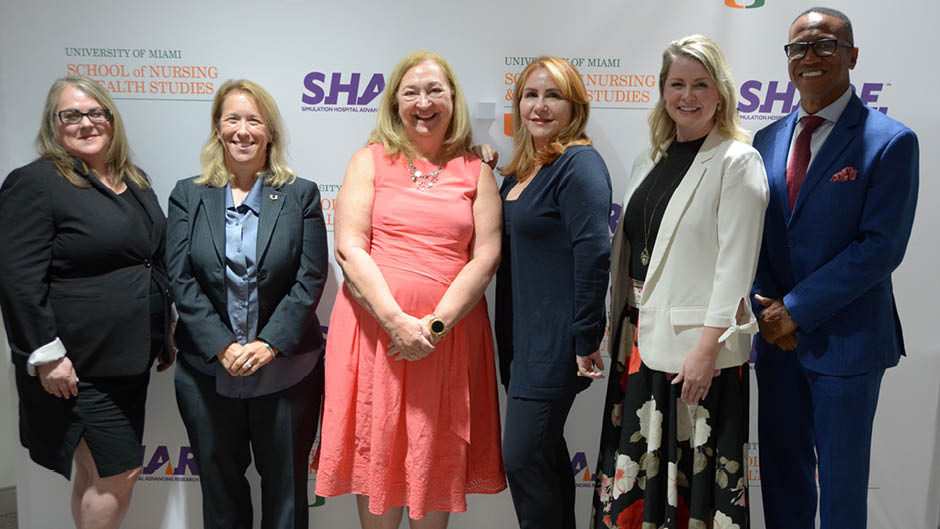Each of us has the power and responsibility to become more educated about human trafficking.
That was the takeaway message a distinguished panel of anti-trafficking advocates shared during “Human Trafficking Response — A Conversation,” presented by the School of Nursing and Health Studies (SONHS) Dean’s Spring 2024 Lecture Series.
The panelists, who hail from diverse law enforcement and health care backgrounds, shared their own stories of commitment to human trafficking awareness education. They emphasized the importance of taking a victim-centered, trauma-informed approach as well as accepting personal responsibility for changing the culture that has allowed human trafficking to thrive in our midst as a society.
The event was held at the School’s Simulation Hospital Advancing Research and Education (S.H.A.R.E.®) on Wednesday, January 24, 2024, in observance of Human Trafficking Prevention Month.
It was made by possible by the Maria G. Lamas Featured Speaker Series for Human Trafficking Education and Prevention Endowment.
Dean Cindy L. Munro opened the event with a brief video demonstrating the work SONHS faculty and nurse educators at S.H.A.R.E.® are pioneering to prepare the health workforce for encountering potential victims of human trafficking in the health care setting.
“Health care providers, no matter where they work or live, are very likely to come in contact with human trafficking victims,” said Dean Munro. “It is imperative that nurses and all health care providers are able to recognize people impacted by human trafficking and respond appropriately to their extensive, complex, often urgent needs.”
According to the Department of Homeland Security, human trafficking involves the use of force, fraud, or coercion to obtain some type of labor or commercial sex act.
“To date, we have led over 600 students and health professionals through our award-winning simulation-enhanced human trafficking awareness curriculum and made human trafficking awareness a top priority for the school in the University’s Ever Brighter campaign,” said Dean Munro.
Jessica Peck, DNP, APRN, CPNP-PC, CNE, CNL, FAANP, FAAN, a pediatric nurse practitioner and clinical professor at the Louise Herrington School of Nursing Baylor University in Texas, moderated the discussion. She introduced UM Miller School alumna Heidi Schaeffer, M.D. ’98, an emergency room physician and educator; Victor Williams, a former special investigator for the U.S. Department of Homeland Security (DHS); and Brenda Mezick, Esq., Assistant State Attorney for the Eleventh Judicial Circuit, chief of the Human Trafficking Unit, and attorney supervisor for the State Attorney’s Human Trafficking Task Force.
“I want to emphasize that we all started somewhere,” said Dr. Peck, who has served as a consultant to the U.S. Congress and worked with the U.S. Department of Health and Human Services and an interprofessional team to create core competencies for health professionals caring for individuals exploited and abused through trafficking. “We began to get educated. We started to realize what was going on in our own communities, and we recognized that we each have a very unique professional skillset that we can engage to make an incredible difference.”
As president of the National Association of Pediatric Nurse Practitioners, Peck created the Alliance for Children in Trafficking. She was also instrumental in passing a Texas House Bill mandating continuing education about human trafficking for all care providers in that state.
“Looking back 10 years ago, I never thought I would be advising Congress. I’m a nurse practitioner. I thought that I’d prescribe Tamiflu, frankly,” she said. “We can all do something, so I would encourage you as we have this conversation to think about what you can do to support this cause because this is impacting real people in real time in our communities.”
Introducing Victor Williams, who spent over 34 years in law enforcement, she noted that “anti-trafficking efforts are in their infancy,” citing the creation of the Trafficking Victims Protection Act of 2000 as the first comprehensive federal law to address trafficking.
Williams is vice chair of the Miami-Dade County Human Trafficking Coalition and previously served as coordinator for the South Florida Human Trafficking Task Force. His life’s work is devoted to educating law enforcement agencies about the culture changes needed to combat trafficking. “The key word is evolution,” said Williams, founder & CEO of the anti-trafficking education nonprofit Quest2Freedom. “I speak from my heart in hopes that if most men know what I know, we can cut this issue in half instantly. So it’s really about us.”
When Williams was first assigned to the DHS human trafficking group many years ago, his first case involved a group of women trafficked from Mexico to South Florida. It took his team nearly a year, through trial and error, to enable the women to feel safe enough to speak about their abuses, he admitted. In her impact statement, one of the woman revealed she’d been taken at age 14 to Homestead. There, in a trailer parked on the side of the road by the vast farm fields, she was forced to have sex with 10 to 25 men every day.
“That was my wakeup call,” said Williams. “I knew I would be doing some work in this for the rest of my life.”
Like Williams all of the panelists had graphic stories of the neglect, abuse, and violence victims of trafficking face. They shared these harsh realities in order to help the audience understand the urgency and extent of the problem—as well as to remind them not to be too quick to judge victims who may come under their care as seemingly less-than-cooperative patients. Combatting human trafficking, they said, begins with addressing our own judgments, biases, stigmas, and cultural indoctrination.
“[I]t’s such a part of our culture that it’s sitting there right in front of us and we don’t see it,” said Williams. “I don’t know how victims got there. All I know is this is a human being that is caught up in a situation that I kinda understand, and my first job is, ‘How do I help?’ Victim-centered, trauma-informed. Law enforcement—we had to learn that. I don’t have a case unless I get this victim back to some type of space where they can start to have control of themselves.”
Physician and educator Heidi Schaeffer, M.D. ’98, a visiting scholar at SONHS, has collaborated with Williams for years. She said she was “kind of thrown into the trenches” after attending a Broward County Human Trafficking Coalition about 14 years ago. She has since shared her expertise in the diagnosis and treatment of human trafficking and other forms of exploitation with emergency department staffs and thousands of students and faculty throughout South Florida. She was also instrumental in the passing of victim-centered laws requiring human trafficking hotline signage and mandatory continuing education for health professionals in the state of Florida.
Her investment in the cause led to the creation of the Dr. Heidi Schaeffer Academic Lab for Education & Training Against Human Trafficking at S.H.A.R.E.®
“I didn’t start out writing legislation or going before Congress or even thinking I was going to interface so much with law enforcement or state attorneys’ offices, but all of us can do something,” said Dr. Schaeffer. “If you’re a nurse or you’re a physician today, it’s your job to really meet these patients where they’re at, build a rapport, plant that seed. Are they going to come running into your arms saying, ‘I’m a victim of trafficking’? Never! I’ve never had it in all the years I’ve been treating these patients. They’re not going to talk in front of someone who’s hurting them.”
Schaeffer noted that Miami-Dade, Broward, and Palm Beach counties are the hub of human trafficking in Florida, the state with the third-highest number of human trafficking cases in the nation.
“Back in the day, I would suture them up and get them out of the ER. You know treat and street,” she said. “But now that I’m educated, I want to give that extra moment and that extra bonding time with my patient to say, ‘Is it possible you are being forced to give sex for money? Are you being forced to work for money?’”
Brenda Mezick was one of the first and few to specialize in the prosecution of offenses involving human trafficking, noted Peck. Mezick has gone on to lead her office in the groundbreaking Human Trafficking-Child Plan and Recovery initiative. “There are actually focused attempts to target women with small children, particularly infants [as trafficking victims],” she told the audience. “If they have a small child they know that they can control that woman. … Just in the past year we’ve had five cases where children were being used…”
Mezick added that traffickers are “selling” the glamourous ideal of Miami on Instagram and TikTok to lure their victims.
The speakers said they didn’t set out to be anti-trafficking advocates. Rather, they all had moments of realization about the brutal impact human trafficking was having in their own back yard. “This is all about all of us, and we don’t have to wait until a friend, a family member, someone we love is caught up in this too,” said Williams. “We all have the power.”
Peck said one reason human trafficking prevails is because most of us don’t want to see ourselves, and our own vulnerability, in the victims. “It’s an emergence of stigma,” she explained. “We put someone else in a different social category because we want to think, I would be smarter than that, therefore I am safe. Therefore this does not scare me. So it’s a coping mechanism; it’s just an unhealthy one that we have to retrain ….
“As an attorney, as a federal agent, as a health care provider, we are not immune to biases,” she continued. “We are not immune to misconceptions that are provided to us by the media, by well-meaning things.”
The panelists made a strong connection with their audience. “I enjoyed the presentation a lot,” said one attendee, Jayden Prestiano, a health science major at SONHS. “I learned a lot more facts, and I feel more educated about the topic. I’m happy I now know the phone number [human trafficking hotline, 888-3737-888] in case I see something.”
Sponsor Maria Lamas also attended the event and expressed her continuing support for the School’s education efforts. “This was an amazing and inspiring panel,” said Lamas. “Ending human trafficking is an ambitious goal—as long as there is a demand, victims will be supplied. However, I am committed to raising awareness about this crisis, particularly among future health care providers like those at the University of Miami School of Nursing and Health Studies. As we know, health care providers are likely to be one of the only human contacts a trafficked person will have outside of his or her environment, and the health care system is probably one of the only channels through which, if a victim is identified, further abuse can be prevented.”
The National Human Trafficking Hotline is 1-888-3737-888; the Human Trafficking Miami Hotline is 305-FIX-STOP. The Florida Department of Children and Families abuse hotline is 1-800-96-ABUSE.
